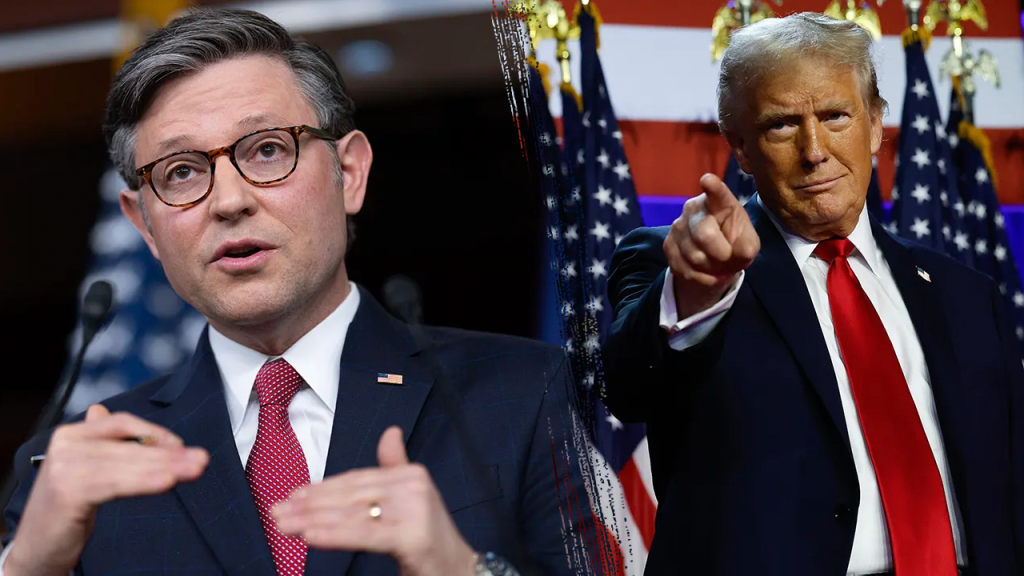Speaker Mike Johnson discussed President-elect Trump’s support for a conservative policy overhaul through a single large bill that would be sent to both the House and Senate by May. This strategy aims to use the reconciliation process to pass significant conservative policy and budget changes. Reconciliation allows the Senate to pass legislation with a simple majority on budgetary and fiscal matters, avoiding the traditional 60-vote threshold. The Senate parliamentarian plays a key role in determining the relevance of the legislation to U.S. fiscal matters. Democrats’ past attempts to use reconciliation for mass amnesty measures were stopped, and Republicans may face similar challenges when adding border security provisions to the bill.
Congressional Republicans were divided on whether to pass one or two reconciliation bills, with Senate Majority Leader John Thune proposing two separate bills. However, House Republicans, including Ways and Means Committee Chairman Jason Smith, pushed for a single bill combining border, energy, permitting, and tax provisions. The idea of splitting the bills was supported by Trump adviser Stephen Miller but faced opposition from House members who believed it would be too difficult to pass two bills and might jeopardize expiring GOP tax provisions. The goal is to deliver on priorities such as securing borders, deporting criminals, saving trafficked children, ensuring energy dominance, reducing bureaucracy and wasteful spending, and building upon Trump’s tax cuts.
The House Republicans met behind closed doors and exchanged ideas, priorities, and procedures to accomplish their legislative goals. The Ways and Means Committee released a memo warning that taxes could increase by 22% if Trump’s tax policies expire. Some lawmakers, including House Freedom Caucus Chairman Andy Harris, supported parallel tracks for border security and tax provisions, while others believed taxes are more complicated. The focus is on unity and delivering for the American people in what is expected to be a significant year for Congress and the country.
Trump’s support for a single large bill through the reconciliation process aims to end intraparty friction and streamline the passage of conservative policy changes. The decision to proceed with this strategy underscores the importance of using reconciliation to overcome traditional barriers and ensure that crucial policy priorities are addressed efficiently. By combining border security, energy, permitting, and tax provisions into one bill, Republicans aim to deliver on a comprehensive package of reforms that address essential concerns such as national security, economic growth, and fiscal responsibility. The path forward will require collaboration and coordination among lawmakers to navigate the complexities of reconciliation and achieve their legislative objectives.
The willingness of Republicans to engage in robust discussions and strategize on the best approach to passing conservative policy changes demonstrates their commitment to delivering tangible results for the American people. Despite differing opinions on the number of reconciliation bills to be passed, there is a shared goal of uniting behind a common agenda that addresses critical issues facing the nation. By focusing on key priorities such as border security, energy dominance, and tax policies, Republicans seek to build upon past successes and secure a strong legislative foundation for the future. The coming months will be crucial for advancing conservative policies through Congress and ensuring that the needs and interests of the American people are addressed effectively.
Overall, the discussions among House Republicans highlight the complexities and challenges of passing significant policy changes through the reconciliation process. By emphasizing unity, collaboration, and a shared commitment to conservative values, lawmakers aim to navigate the legislative landscape effectively and achieve their policy objectives. The decision to move forward with a single large bill is a strategic choice that reflects the importance of streamlining the legislative process and focusing on core priorities. As Republicans work to finalize the details of the reconciliation bill, they will continue to engage in dialogue, exchange ideas, and seek consensus on the best path forward. By leveraging their collective strengths and expertise, lawmakers can overcome obstacles, drive meaningful reforms, and deliver concrete results for the American people.













